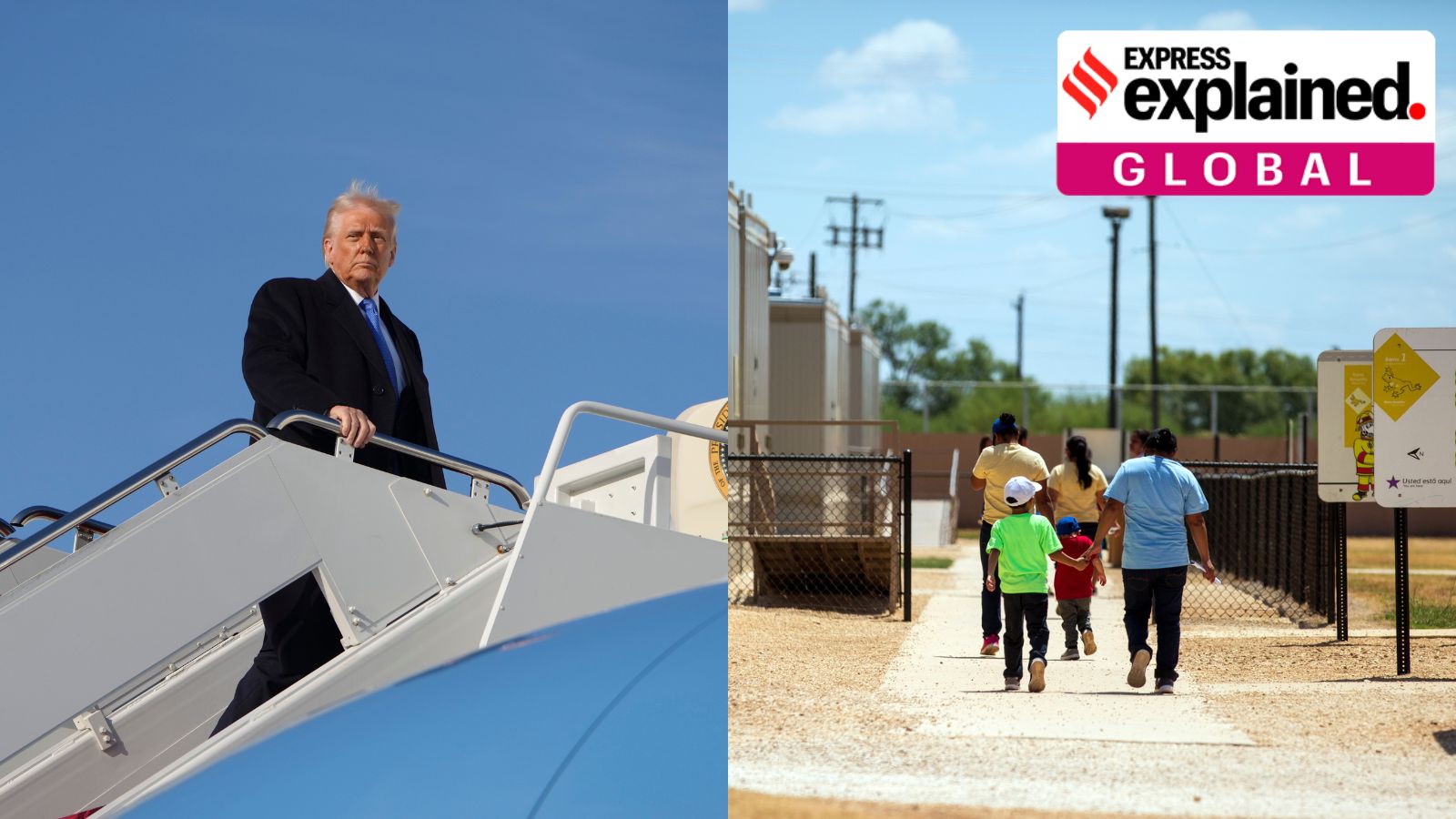What is the CHNV program, and why has the US announced its end?
This step follows actions initiated by the Donald Trump administration in January, which aimed to end 'the broad abuse of humanitarian parole'
 Left: Donald Trump aboard Air Force One; Right - A detention center for undocumented immigrant families in Texas. (NYT Photos)
Left: Donald Trump aboard Air Force One; Right - A detention center for undocumented immigrant families in Texas. (NYT Photos)The US Friday (March 21) announced that it was ending a Biden-era programme that allowed migrants from certain countries “legal pathways” into the US.
In a notice posted to the Federal Registry the Department of Homeland Security (DHS) said that it would revoke the temporary legal status of 532,000 migrants from Cuba, Haiti, Nicaragua and Venezuela, who had arrived in the US since October 2022.
The parole period, including the work permits and protection from deportation under the programme, will expire on April 24. All parolees under the programme now face the imminent threat of deportation.
“To effectuate their prompt removal, the US government may in its discretion initiate expedited removal proceedings where appropriate. Expedited removal is available only when an alien has not been continuously present in the United States for at least the two years preceding the date of the inadmissibility determination,” the notice said.
This step follows actions initiated by the government in January, which aimed to end “the broad abuse of humanitarian parole.” Here is what to know.
What is parole?
Parole under the Immigration and Nationality Act officially grants a person permission to enter and temporarily stay in the US under DHS supervision. Under the act, the DHS secretary enjoys the discretionary authority to “parole into the United States temporarily under such conditions as he may prescribe only on a case-by-case basis for urgent humanitarian reasons or significant public benefit any alien applying for admission to the United States.”
A parolee is permitted to remain in the US only for the duration specified in the parole grant, and may be granted work authorisation. A 2020 Congressional Research Service (CRS) report says that a range of parole programmes were created in response to different situations, and allowed entry to different groups of foreign nationals who were ineligible for refugee status.
However, this does not translate into formal admission, meaning the person must still apply for such admission to be able to remain in the country for a longer period. Similarly, securing parole does not automatically entitle beneficiaries to the status of Lawful Permanent Resident (LPR) or green card holder. Only some parolee groups have secured LPR status under a 1960 law after securing immigrant visas and meeting other requirements.
How did Biden allow parole for CHNV migrants?
In 2022, President Joe Biden introduced a parole entry programme for Venezuelans, expanding this to Cubans, Haitians and Nicaraguans in 2023. The US does not have diplomatic relations with the four countries.
The administration faced flak for failing to contain record levels of illegal crossings across the US-Mexico border, recorded at 1.5 million in 2022, according to a 2023 The New York Times report.
According to The NYT report, these parole programs would be temporary, with a two-year expiry date unless they were renewed. Before the programme was introduced, asylum-seekers from the CHNV countries would be stuck in overcrowded shelters in New York and other cities. They were barred from working for at least six months after an asylum case was opened.
The humanitarian parole programme, popularly known as the CHNV programme, instead required immigrants to have a US-based sponsor who would take financial responsibility for settling them and helping them secure a work permit if authorised. This, according to the report, was welcomed by employers with labour shortages.
The programme seemed to be successful, reducing run-ins by CHNV migrants with the Border Patrol to a two-year low since the programme was introduced in January 2023.
“The successful use of these parole processes and the significant decrease in illegal crossing attempts demonstrate clearly that noncitizens prefer to utilise a safe, lawful and orderly pathway to the United States if one is available, rather than putting their lives and livelihoods in the hands of ruthless smugglers,” the DHS then said in a statement.
Ending CHNV parole
A key plank of Donald Trump’s presidential campaign was his promise to deport millions of people living illegally in the US. He initiated steps towards this on his very day in office in January, including the Presidential Action “Protecting the American People Against Invasion”, where he had first announced an end to the temporary parole programmes.
In his inaugural address, he said, “All illegal entry will immediately be halted, and we will begin the process of returning millions and millions of criminal aliens back to the places from which they came.”
According to the DHS notice, the CHNV programmes are “Unnecessary to Achieve Border Security Goals”, finding these to be “insufficient to address very high levels of illegal immigration”. The notice said that the programmes did not do anything to check illegal immigration across the US south border.
The notice said that these programmes are inconsistent with the current administration’s foreign policy goals, and its larger America First goal.
The notice also blamed the programmes for increasing access to Federal benefits to the migrants, disrupting normal border patrol functioning, and increasing immigration backlogs.
The order to terminate the programmes has already been challenged in federal courts.
- 01
- 02
- 03
- 04
- 05






































